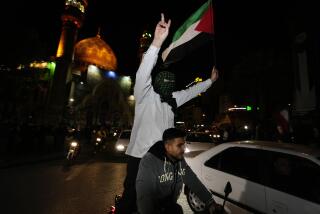Poll Finds Arabs Are Extremely Antiwar
In pronounced numbers, Arabs believe that war with Iraq will produce more terrorism against the United States and greater instability in the Middle East and will worsen prospects for settlement of the Israeli-Palestinian conflict, according to a newly released poll.
The poll, conducted in six countries -- all with close U.S. ties -- found that only a small minority of respondents had a favorable opinion of the United States. U.S. popularity in Saudi Arabia, the Persian Gulf giant that has served as a pillar for American economic and political interests, was the lowest, at only 4%.
The findings weren’t much better elsewhere. Only 6% in Jordan and Morocco, 8.8% in the United Arab Emirates, 13% in Egypt and one out of three in Lebanon have positive attitudes about the United States.
“This is the ... most pervasive resentment that I have documented or have seen in any recorded surveys,” said Shibley Telhami, who compiled the questions for the Zogby International polling firm and the University of Maryland.
“There have been many lows, including before the 1991 Gulf War, but I’ve never seen it so one-sided. When support is as low as 4% or 6%, it tells you the degree of resentment that has spread across society,” Telhami said.
The most striking results were on the subject of future terrorist attacks. In Saudi Arabia, the birthplace of Osama bin Laden and home to 15 of the 19 Sept. 11 hijackers, 97% of respondents believe that a war in Iraq will trigger more terrorism against the United States.
In the other countries, at least three-quarters of the population believes that military intervention in Iraq will ignite more terrorism.
“Arab public opinion indicates the level of passionate anger, the factor that most experts fear will fuel militancy in the region,” Telhami said. “We are swimming in uncharted waters because of the level of opposition.”
The pollsters said they sampled a total of 3,020 men and women in the capitals of Egypt, Jordan, the United Arab Emirates, Saudi Arabia, Lebanon and Morocco, with a margin of error of plus or minus 3.8 percentage points in some countries and plus or minus 5 percentage points in others. The questionnaires were filled out between Feb. 19 and last Tuesday.
Opposition to a war is high even if the United States gets a U.N. resolution authorizing the use of force. Three out of four Arabs oppose war with U.N. backing, and 90% oppose war if the United States acts without Security Council support, the poll found.
“The results tell me that the opposition to war is so passionate and the fear of the consequences so high that regardless of what happens in Iraq itself, the United States will have a tough time gaining acceptance of its presence in the region,” Telhami said.
The survey also showed that an “overwhelming” percentage of Arabs believe that American policy on Iraq is motivated by oil and, secondarily, by U.S. support for Israel.
In a further jab at the United States, French President Jacques Chirac -- who has led the opposition to U.S. war plans against Iraq -- was cited in the poll as one of the most admired world leaders.
Arabs are also uniformly pessimistic about stability in the region after a U.S.-led war. Anywhere from 60% of Jordanians to 91% of Saudis think that a new conflict will create greater instability, the survey found.
Although the Bush administration has pledged that any war in Iraq would be twinned with efforts to resolve the Arab-Israeli conflict, few respondents to the survey hold out hope for a settlement.
More to Read
Start your day right
Sign up for Essential California for news, features and recommendations from the L.A. Times and beyond in your inbox six days a week.
You may occasionally receive promotional content from the Los Angeles Times.






